Trigger warning: Mentions of murder and violence
1980s, Kolar, Karnataka
Two brothers, Manjunath and Raghavendra Shanmugam, were returning from school. As they chatted, Manjunath told his younger brother how he had stopped a classmate from bullying another student. This was not the first time that this young boy had dared to question what was clearly wrong.
November 2005, Lakhimpur Kheri, Uttar Pradesh
This same righteous boy was now an ; and a sales officer at the Indian Oil Corporation (IOC). One of his responsibilities was checking petrol adulteration at petrol pumps. He set out on a tour of Lakhimpur Kheri district in November 2005. He found anomalies, for the second time, at the Mittal Automobile Petrol Pump and was about to take measures to seal it. On the night of 19 November, he was murdered.
Manjunath’s family, who were attending a family function in Chennai, were shocked beyond words. How could they even begin to fathom such an unjust shooting — where their son’s life was cut short for simply standing up for what was right? As they grappled with the loss of their 27-year-old son, the news sent shockwaves across the country.
A few hundred kilometres away, in Mysuru, a young couple, Anjali Mullatti and H Jaishankar, watched the news unfold on their TV screens. As IIM alumni themselves, they were shocked. There was a lot of anger, grief, and frustration within the IIM alumni groups across Ahmedabad, Bengaluru, Calcutta, and Lucknow — the four IIMs at that time. While many vented their grief and anger, no one seemed to be doing anything on the ground.
Anjali and Jaishankar decided they would take action if no one else did. Their efforts led them to Kamini Jaiswal, a prominent Supreme Court lawyer, who connected them with criminal lawyer I B Singh in Lucknow. Thus began their fight to get justice for Manjunath.
The couple took turns going to Lakhimpur Kheri for every hearing, pushing for a fast-track trial that led to a verdict within 10 months. All the eight accused were found guilty.
Anjali and Jaishankar recall watching the news about Manjunath as if it were yesterday. On one hand, there was anger toward IOC for allowing this to happen, while on the other, seeing his grieving parents — simple, middle-class folks — grapple with the magnitude of this irreparable loss was heart-wrenching.
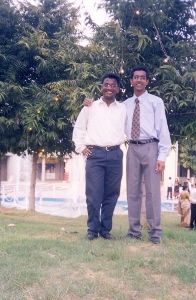
Manjunath with his friend
The helplessness of the common people in the face of the harsh system was painfully evident. Anjali and Jaishankar were unable to forget Manjunath or what his mother had said. It was time for action. “While his parents may not have been able to , we, as a community of IIM professionals, could. We decided to harness this collective power for good,” Anjali tells The Better India.
They quickly contacted Manjunath’s friends to understand the case details. Learning that a charge sheet had to be filed within 90 days to prevent the accused from obtaining bail, they contacted SP Zaki Ahmad, who was in charge of the case and had been instrumental in the quick arrest of the accused.
Around the same time, public outrage over the acquittal in the Jessica Lal case was at its peak, where the rich and influential seemed to escape justice. This collective anger, combined with Manjunath’s case, only intensified the calls for accountability.
Public outcry pierced the air, protesting against the powerful petrol pump owners who dared to take the life of a young man from Kolar. He had made his way to IIM Lucknow through tremendous dedication and was working at his first job. He had been the boy who dared to raise questions about anything wrong he saw, ever since he was a child.
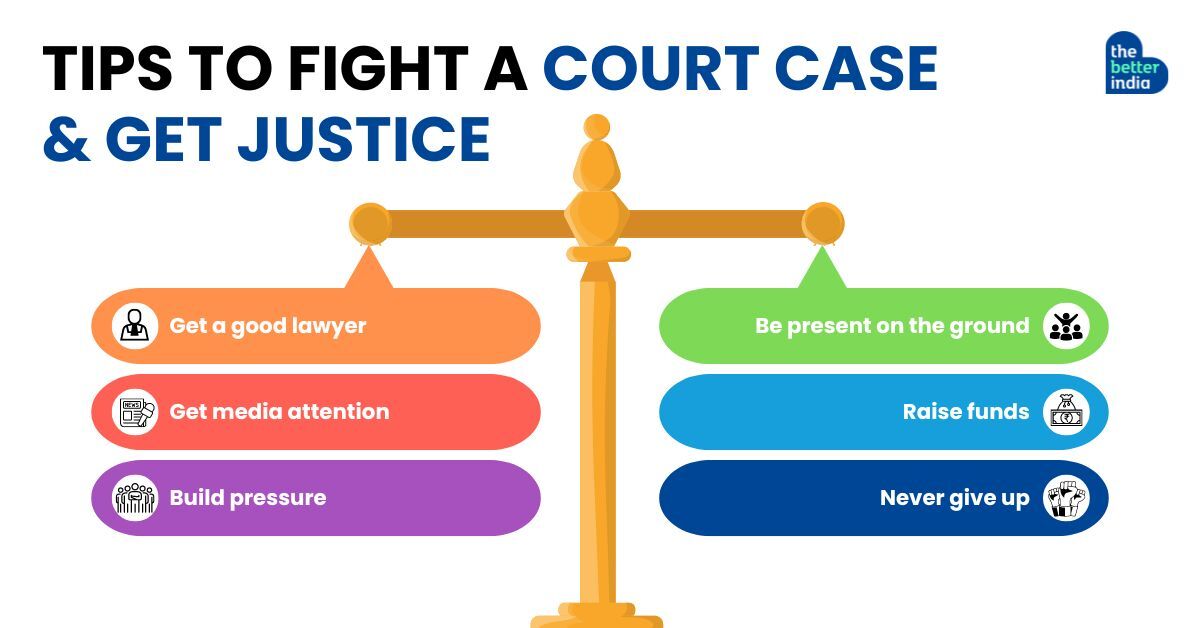
Raghavendra remembers his brother as a fearless being. “It was in his nature. He was one of those rare people who wanted to bring about change in society,” he shares.
People like Manjunath are rare. Even today, where many are comfortable with bribing to take the easy way out, he was a man who followed the rules and believed in morality and justice. He was brave, bold, and every bit special. He was also social, very popular and charming, as his batchmates attest.
The eldest of three siblings, Manjunath grew up in Kolar Gold Fields, where his father worked in Bharat Earth Movers Limited (BEML). After pursuing engineering in Mysuru, he earned his MBA from IIM Lucknow.
Anjali and Jaishankar, who had left their fast-paced corporate jobs in Mumbai in 2004 and moved to Mysuru for a quieter life, never imagined they would be thrust into such a significant legal battle. “We have a strong sense of right and wrong, which was reinforced by this case. We were triggered by the injustice that had happened, and mere lip service wasn’t going to cut it for us,” shares Jaishankar.
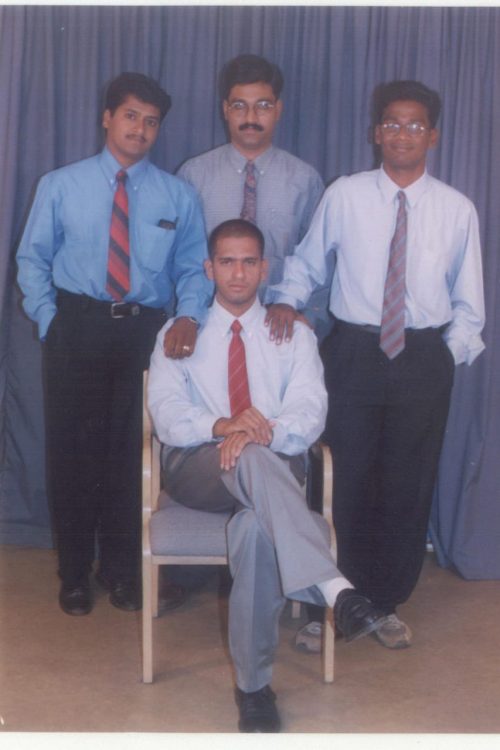
Manjunath (extreme right) was extremely popular in college.
Initially, the couple intended to offer administrative support to a trust, formed to fight the case. The plan was to bring together the four to form the trust. However, as that did not happen, in February 2006, they registered the Manjunath Shanmugam Trust to lead the legal battle and took matters into their own hands.
Raghavendra recalls Anjali telling him, “You take care of your parents. We will take care of the legal proceedings.”
After speaking with the investigating officers in the case, the next and most important step was to find a good lawyer. Thanks to IIM alumni contacts, they got in touch with Supreme Court lawyer Kamini Jaiswal and went to meet her in Delhi. To her surprise, the lawyer already had all the facts of the case on her desk, including the charge sheet.
Singh states that his goal was to ensure a swift trial to prevent witnesses from turning hostile. With help from Pramesh Shukla, the sub-inspector who was the case investigating officer, and the constable who had found Manjunath’s body, he painstakingly put together the case for the prosecution.
The trial began on 5 June, 2006, at the District and Sessions Court in Lakhimpur Kheri. Along with Anjali, IIM Lucknow students attended the first hearing; Jaiswal also came from Delhi to attend the hearing.
Over the next nine months, 23 witnesses were presented by the prosecution, the most challenging of whom was an IOC employee who had been Manjunath’s boss. The slain official’s call records showed that he had spoken at length with his boss the night before his murder. It was likely that they discussed the adulteration at the Mittal petrol pump and that he would seal it.
“His boss’ testimony was key to proving the motive. Manjunath had spoken to him for almost 20 minutes on the night of his murder, telling him that he was going to the petrol pump to collect evidence. But his boss denied receiving the call,” Anjali says.
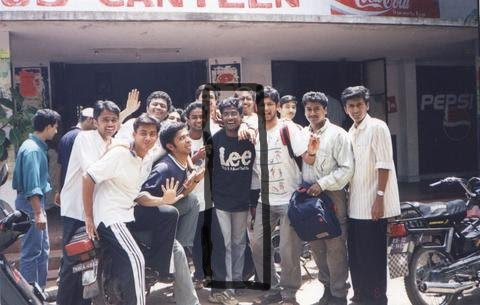
Manjunath with his college friends.
“We struggled to get him to testify. Until the day of the hearing, we didn’t know if he would even show up to testify,” she adds.
On 23 March, 2007 — after a trial of just 10 months — the verdict was pronounced, finding all eight accused guilty of murder. The main accused, Pawan Kumar Mittal, was sentenced to death, while the seven others were sentenced to life imprisonment.
Securing justice was far from easy, and involved humongous efforts from the duo and the volunteers of the trust. Here’s how Anjali and Jaishankar ensured a fast-tracked trial:
Tips to Fight a Court Case & Get Justice
Through their contacts, the couple got a committed, skilled, and knowledgeable lawyer. According to the couple, having a senior lawyer who was completely committed to the case was a game-changer.
They had to ensure that the case stayed in the spotlight. So, Anjali and Jaishankar met with editors from various media organisations, who supported them by consistently reporting on the case. Anjali particularly mentions The Indian Express — who sent a reporter for every hearing — and NDTV.
They made sure the hearings weren’t delayed by getting letters from influential people like Narayana Murthy and Kris Gopalakrishnan of Infosys and senior IIM alumni, which they sent to the Chief Justice of India.
For every hearing, either Jaishankar or Anjali would travel from Mysuru to Lakhimpur Kheri. They would post the hearing dates in online alumni groups; alumni who were free on the date, would also attend. A group of IIM Lucknow student volunteers took turns to be present at the hearings.
Thanks to their extensive network, they were able to raise funds for all the legal and travel expenses.
Most importantly, despite the fight being solitary and difficult, they never lost hope.
Both Anjali and Jaishankar, travelled to Lakhimpur Kheri at least 10 times during the trial. Their journey involved taking a bus to Bengaluru, a flight to Delhi, then to Lucknow, followed by a cab to Lakhimpur Kheri.
What pushed them to fight for a boy they had never met? Didn’t they ever feel bogged down? “Certainly. Some days were tough. At times, it seemed like an impossible task. We were carrying a heavy responsibility that we had to fulfil. We had to give our best,” says Anjali.
Apart from IIM alumni volunteers, various people — complete strangers — wrote in and helped, which was a major support, they say. To honour his memory, on Manjunath’s first death anniversary, the trust inaugurated India’s first Right To Information Act (RTI) helpline. The helpline ran for three years, helping thousands of citizens use the act to fight corruption. They also established the Manjunath Shanmugam Integrity Award to honour individuals who fought against systemic corruption.
Their fight for justice continued until 2015, as the convicts appealed in the Allahabad High Court in 2009, followed by the Supreme Court in 2015. While the High Court upheld the convictions, it commuted Mittal’s death sentence to life imprisonment. The Supreme Court also upheld the convictions.
After immersing yourself in a case like this for so long, life changes. One’s perspective towards life evolves, and for Anjali and Jaishankar, it was no different. While they had always been straightforward people, this experience made them even more so.
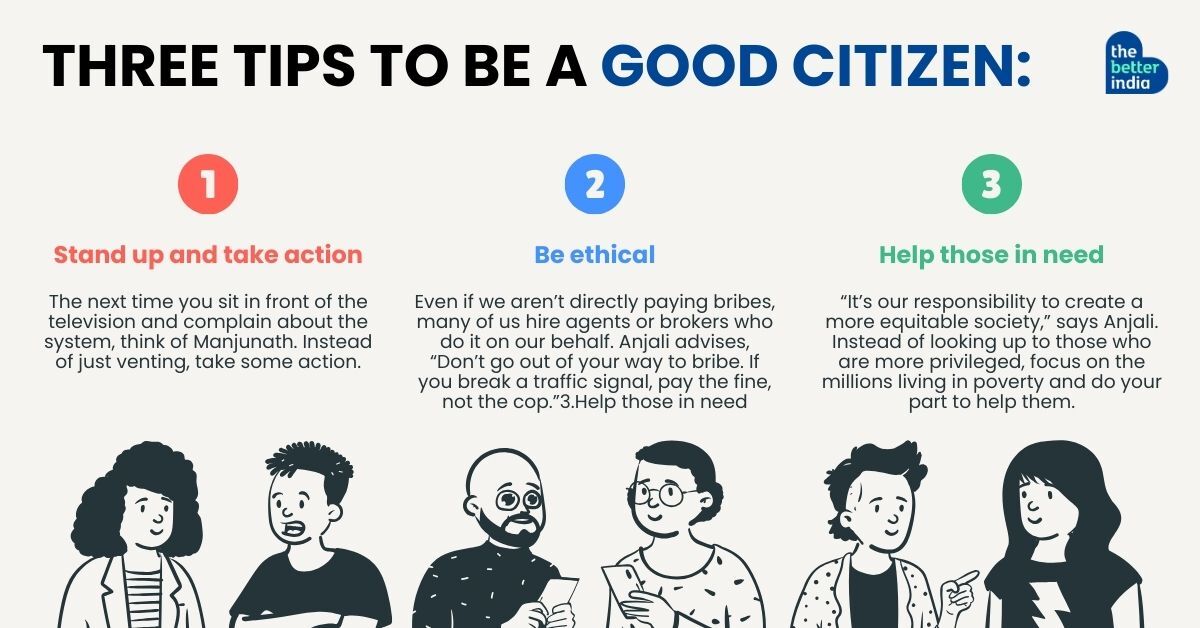
Taking the easy way out was never an option for them.
“Believe that the system works. It might seem intimidating or impossible to get something done in a government institution, but believe me, it is possible. We did not pay even a single rupee as a bribe, and we got it done. It will take time, but you first have to decide that you will not take the shortcut,” says Jaishankar.
The couple set up an edtech firm in 2009. Even in their corporate lives,they ensured that they lived by , even if it meant slower progress.They remained humble and stayed away from the limelight. All they want people to realise from their fight is that each of us can take small steps toward living a life of integrity.
Three tips to be a good citizen:
The next time you sit in front of the television and complain about the system, think of Manjunath. Instead of just venting, take some action. It could be something as small as tweeting about a pothole to the local administration. There is a chance that it might spur action. Always raise your voice against injustice.
As philosopher Edmund Burke once said, “The only thing necessary for the triumph of evil is for good men to do nothing.”
Even if we aren’t directly paying bribes, many of us hire agents or brokers who do it on our behalf. Anjali advises, “Don’t go out of your way to bribe. If you break a traffic signal, pay the fine, not the cop.”
“It’s our responsibility to create a more equitable society,” says Anjali. Instead of looking up to those who are more privileged, focus on the millions living in poverty and do your part to help them.
“Your small contribution can make a big difference in someone’s life. Give whatever you can — whether it’s Rs 1,000 or Rs 10,000. It’s important for your own peace of mind,” she adds.
Even as Anjali and Jaishankar remain modest about their efforts, the Shanmugam family is deeply grateful to them. “They dedicated their lives for us. God comes in different forms. Everyone who came forward to help, motivate, and console us, including Manjunath’s friends and juniors, were manifestations of God. They showed me that there are good people in society, to balance out the bad,” says Raghavendra.
The couple showed the country that all it takes is for one person to take charge and act. Instead of merely making this case a dinner table conversation, they went on the ground and fought. All it takes is that first step.
What will be your first step?
Edited by Khushi Arora, Images Courtesy Raghavendra Shanmugam
1980s, Kolar, Karnataka
Two brothers, Manjunath and Raghavendra Shanmugam, were returning from school. As they chatted, Manjunath told his younger brother how he had stopped a classmate from bullying another student. This was not the first time that this young boy had dared to question what was clearly wrong.
November 2005, Lakhimpur Kheri, Uttar Pradesh
This same righteous boy was now an ; and a sales officer at the Indian Oil Corporation (IOC). One of his responsibilities was checking petrol adulteration at petrol pumps. He set out on a tour of Lakhimpur Kheri district in November 2005. He found anomalies, for the second time, at the Mittal Automobile Petrol Pump and was about to take measures to seal it. On the night of 19 November, he was murdered.
Manjunath’s family, who were attending a family function in Chennai, were shocked beyond words. How could they even begin to fathom such an unjust shooting — where their son’s life was cut short for simply standing up for what was right? As they grappled with the loss of their 27-year-old son, the news sent shockwaves across the country.
A few hundred kilometres away, in Mysuru, a young couple, Anjali Mullatti and H Jaishankar, watched the news unfold on their TV screens. As IIM alumni themselves, they were shocked. There was a lot of anger, grief, and frustration within the IIM alumni groups across Ahmedabad, Bengaluru, Calcutta, and Lucknow — the four IIMs at that time. While many vented their grief and anger, no one seemed to be doing anything on the ground.
Anjali and Jaishankar decided they would take action if no one else did. Their efforts led them to Kamini Jaiswal, a prominent Supreme Court lawyer, who connected them with criminal lawyer I B Singh in Lucknow. Thus began their fight to get justice for Manjunath.
The couple took turns going to Lakhimpur Kheri for every hearing, pushing for a fast-track trial that led to a verdict within 10 months. All the eight accused were found guilty.
“We are forever indebted to them. They ensured justice for my brother. Though we can never get him back, we found some peace after the convicts were sentenced,” says Raghavendra.
No longer mute spectators
Anjali and Jaishankar recall watching the news about Manjunath as if it were yesterday. On one hand, there was anger toward IOC for allowing this to happen, while on the other, seeing his grieving parents — simple, middle-class folks — grapple with the magnitude of this irreparable loss was heart-wrenching.

Manjunath with his friend
Manjunath’s mother made a statement on TV that echoed across the country: “I’m crying tears of blood. What can we (husband and wife) do?”
The helplessness of the common people in the face of the harsh system was painfully evident. Anjali and Jaishankar were unable to forget Manjunath or what his mother had said. It was time for action. “While his parents may not have been able to , we, as a community of IIM professionals, could. We decided to harness this collective power for good,” Anjali tells The Better India.
They quickly contacted Manjunath’s friends to understand the case details. Learning that a charge sheet had to be filed within 90 days to prevent the accused from obtaining bail, they contacted SP Zaki Ahmad, who was in charge of the case and had been instrumental in the quick arrest of the accused.
Around the same time, public outrage over the acquittal in the Jessica Lal case was at its peak, where the rich and influential seemed to escape justice. This collective anger, combined with Manjunath’s case, only intensified the calls for accountability.
Public outcry pierced the air, protesting against the powerful petrol pump owners who dared to take the life of a young man from Kolar. He had made his way to IIM Lucknow through tremendous dedication and was working at his first job. He had been the boy who dared to raise questions about anything wrong he saw, ever since he was a child.

Raghavendra remembers his brother as a fearless being. “It was in his nature. He was one of those rare people who wanted to bring about change in society,” he shares.
People like Manjunath are rare. Even today, where many are comfortable with bribing to take the easy way out, he was a man who followed the rules and believed in morality and justice. He was brave, bold, and every bit special. He was also social, very popular and charming, as his batchmates attest.
The eldest of three siblings, Manjunath grew up in Kolar Gold Fields, where his father worked in Bharat Earth Movers Limited (BEML). After pursuing engineering in Mysuru, he earned his MBA from IIM Lucknow.
“Everyone is going to die one day, but what they leave behind, lives forever. I think my brother had a message to share with the world. He showed us how ruthless society can be, and pushed us to think — will you raise your voice?” opines Raghavendra.
The couple who dared to fight
Anjali and Jaishankar, who had left their fast-paced corporate jobs in Mumbai in 2004 and moved to Mysuru for a quieter life, never imagined they would be thrust into such a significant legal battle. “We have a strong sense of right and wrong, which was reinforced by this case. We were triggered by the injustice that had happened, and mere lip service wasn’t going to cut it for us,” shares Jaishankar.

Manjunath (extreme right) was extremely popular in college.
Initially, the couple intended to offer administrative support to a trust, formed to fight the case. The plan was to bring together the four to form the trust. However, as that did not happen, in February 2006, they registered the Manjunath Shanmugam Trust to lead the legal battle and took matters into their own hands.
Raghavendra recalls Anjali telling him, “You take care of your parents. We will take care of the legal proceedings.”
After speaking with the investigating officers in the case, the next and most important step was to find a good lawyer. Thanks to IIM alumni contacts, they got in touch with Supreme Court lawyer Kamini Jaiswal and went to meet her in Delhi. To her surprise, the lawyer already had all the facts of the case on her desk, including the charge sheet.
Jaiswal connected them to I B Singh, a renowned criminal lawyer based in Lucknow. The first thing he said was, “I will take up the case, and I won’t charge any money for it.”
Singh states that his goal was to ensure a swift trial to prevent witnesses from turning hostile. With help from Pramesh Shukla, the sub-inspector who was the case investigating officer, and the constable who had found Manjunath’s body, he painstakingly put together the case for the prosecution.
The trial began on 5 June, 2006, at the District and Sessions Court in Lakhimpur Kheri. Along with Anjali, IIM Lucknow students attended the first hearing; Jaiswal also came from Delhi to attend the hearing.
Over the next nine months, 23 witnesses were presented by the prosecution, the most challenging of whom was an IOC employee who had been Manjunath’s boss. The slain official’s call records showed that he had spoken at length with his boss the night before his murder. It was likely that they discussed the adulteration at the Mittal petrol pump and that he would seal it.
“His boss’ testimony was key to proving the motive. Manjunath had spoken to him for almost 20 minutes on the night of his murder, telling him that he was going to the petrol pump to collect evidence. But his boss denied receiving the call,” Anjali says.

Manjunath with his college friends.
“We struggled to get him to testify. Until the day of the hearing, we didn’t know if he would even show up to testify,” she adds.
On 23 March, 2007 — after a trial of just 10 months — the verdict was pronounced, finding all eight accused guilty of murder. The main accused, Pawan Kumar Mittal, was sentenced to death, while the seven others were sentenced to life imprisonment.
“I can now sleep in peace,” were Manjunath’s mother’s words after the verdict.
How the couple fought the case
Securing justice was far from easy, and involved humongous efforts from the duo and the volunteers of the trust. Here’s how Anjali and Jaishankar ensured a fast-tracked trial:
Tips to Fight a Court Case & Get Justice
- Get a good lawyer
Through their contacts, the couple got a committed, skilled, and knowledgeable lawyer. According to the couple, having a senior lawyer who was completely committed to the case was a game-changer.
- Get media attention
They had to ensure that the case stayed in the spotlight. So, Anjali and Jaishankar met with editors from various media organisations, who supported them by consistently reporting on the case. Anjali particularly mentions The Indian Express — who sent a reporter for every hearing — and NDTV.
- Build pressure
They made sure the hearings weren’t delayed by getting letters from influential people like Narayana Murthy and Kris Gopalakrishnan of Infosys and senior IIM alumni, which they sent to the Chief Justice of India.
- Be present on the ground
For every hearing, either Jaishankar or Anjali would travel from Mysuru to Lakhimpur Kheri. They would post the hearing dates in online alumni groups; alumni who were free on the date, would also attend. A group of IIM Lucknow student volunteers took turns to be present at the hearings.
- Raise funds
Thanks to their extensive network, they were able to raise funds for all the legal and travel expenses.
- Never give up
Most importantly, despite the fight being solitary and difficult, they never lost hope.
Both Anjali and Jaishankar, travelled to Lakhimpur Kheri at least 10 times during the trial. Their journey involved taking a bus to Bengaluru, a flight to Delhi, then to Lucknow, followed by a cab to Lakhimpur Kheri.
What pushed them to fight for a boy they had never met? Didn’t they ever feel bogged down? “Certainly. Some days were tough. At times, it seemed like an impossible task. We were carrying a heavy responsibility that we had to fulfil. We had to give our best,” says Anjali.
Apart from IIM alumni volunteers, various people — complete strangers — wrote in and helped, which was a major support, they say. To honour his memory, on Manjunath’s first death anniversary, the trust inaugurated India’s first Right To Information Act (RTI) helpline. The helpline ran for three years, helping thousands of citizens use the act to fight corruption. They also established the Manjunath Shanmugam Integrity Award to honour individuals who fought against systemic corruption.
Their fight for justice continued until 2015, as the convicts appealed in the Allahabad High Court in 2009, followed by the Supreme Court in 2015. While the High Court upheld the convictions, it commuted Mittal’s death sentence to life imprisonment. The Supreme Court also upheld the convictions.
‘Believe that the system works’
After immersing yourself in a case like this for so long, life changes. One’s perspective towards life evolves, and for Anjali and Jaishankar, it was no different. While they had always been straightforward people, this experience made them even more so.

Taking the easy way out was never an option for them.
“Believe that the system works. It might seem intimidating or impossible to get something done in a government institution, but believe me, it is possible. We did not pay even a single rupee as a bribe, and we got it done. It will take time, but you first have to decide that you will not take the shortcut,” says Jaishankar.
The couple set up an edtech firm in 2009. Even in their corporate lives,they ensured that they lived by , even if it meant slower progress.They remained humble and stayed away from the limelight. All they want people to realise from their fight is that each of us can take small steps toward living a life of integrity.
Three tips to be a good citizen:
- Stand up and take action
The next time you sit in front of the television and complain about the system, think of Manjunath. Instead of just venting, take some action. It could be something as small as tweeting about a pothole to the local administration. There is a chance that it might spur action. Always raise your voice against injustice.
As philosopher Edmund Burke once said, “The only thing necessary for the triumph of evil is for good men to do nothing.”
- Be ethical
Even if we aren’t directly paying bribes, many of us hire agents or brokers who do it on our behalf. Anjali advises, “Don’t go out of your way to bribe. If you break a traffic signal, pay the fine, not the cop.”
- Help those in need
“It’s our responsibility to create a more equitable society,” says Anjali. Instead of looking up to those who are more privileged, focus on the millions living in poverty and do your part to help them.
“Your small contribution can make a big difference in someone’s life. Give whatever you can — whether it’s Rs 1,000 or Rs 10,000. It’s important for your own peace of mind,” she adds.
Even as Anjali and Jaishankar remain modest about their efforts, the Shanmugam family is deeply grateful to them. “They dedicated their lives for us. God comes in different forms. Everyone who came forward to help, motivate, and console us, including Manjunath’s friends and juniors, were manifestations of God. They showed me that there are good people in society, to balance out the bad,” says Raghavendra.
The couple showed the country that all it takes is for one person to take charge and act. Instead of merely making this case a dinner table conversation, they went on the ground and fought. All it takes is that first step.
What will be your first step?
Edited by Khushi Arora, Images Courtesy Raghavendra Shanmugam
